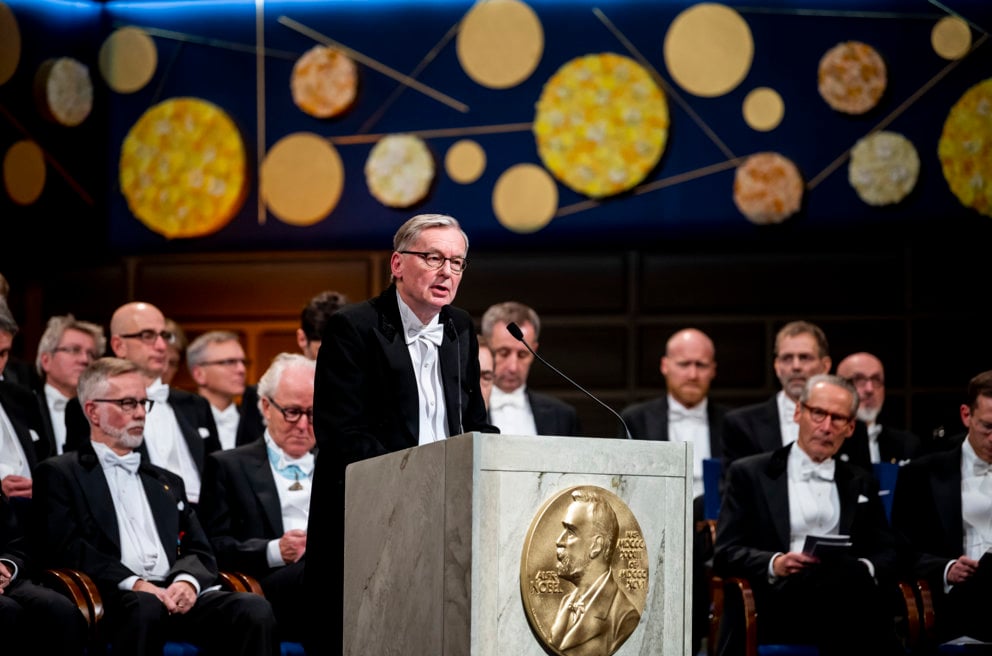Award ceremony speech

Professor Anders Olsson delivering the presentation speech for the 2019 Nobel Prize in Literature at Konserthuset Stockholm, 10 December 2019.
© Nobel Media. Photo: Alexander Mahmoud.
English
Swedish
Presentation Speech by Professor Anders Olsson, Member of the Swedish Academy, Chairman of the Nobel Committee for Literature, 10 December 2019.
Your Majesties, Your Royal Highnesses, Esteemed Nobel Laureates, Ladies and Gentlemen:
Contemporary literature is blooming like never before on alien shores. Such a place is No-Man’s Bay, Peter Handke’s name for the place southwest of Paris that has been his residence for thirty years. Peter Handke, born in Kärnten in Austria, has worked abroad for almost his entire writing career. He has freely chosen exile as a productive path, from where he depicts not metro- polises but the peripheries. In the sweeping story of My Year in the No-Man’s-Bay the narrator describes in scrupulous detail the backwater where he lives. Just as prominent as the noise from a neighbour’s lawnmower, or madcap arias, is the beguiling buzz of wild bees in the rocks or the bristly whiskers of the beaver rats in the nameless pond. Is “pond” the right word? Ask Flaubert! Periphery has become centre.
Peter Handke’s work is suffused with a strong spirit of discovery, a desire to write the world fresh. In his debut year, 1966, he attacked the literary world for its short- comings in describing reality, but over fifty years later, with about 80 works behind him – including films and about a score of plays – it is evident not only that he has realised his dream of a new prose, but also how his writing has become influential for several generations of writers in post-war Europe.
In his extraordinary Repetition, Handke allows his narrator to revisit his childhood environs in eastern Slovenia. He checks into an inn where he makes friends with a waiter. Coming back late one night he sees from his window the waiter carrying a stack of dishes to a stream close by. With graceful movements, he launches them one by one onto the water, letting them sail away. The scene, as mysterious as it is unforgettable, is described dispassionately and without comment. It seems that here, a dream is born of another existence.
Handke’s writing is often about returning to origins to remember the dead, but no strict iteration is possible. In A Sorrow Beyond Dreams: A Life Story, the stark portrayal of his mother after her suicide in 1971, he lets us experience the extent of the catastrophe through his elucidating gaze and restrained language.
Peter Handke’s groundbreaking artistry with language emerges when his hyperactive sense for the particular compels investigation of his own medium. In his books we are often on foot, and his “epic steps” appear with full effect in his story Slow Homecoming 1979. The story being told has almost dissolved in description, but the telling still lives on, guided by the narrator’s grounded feet and a gaze gifted with linguistic eyes. He has written: “To be receptive is everything”.
Peter Handke has said that the classics not only saved him but also preserved him. But he is also a deeply contemporary writer who must confront a paternal heritage perverted by the Nazis’ occupation of Austria in the war. He represents a Slovenian maternal lineage, which motivates his anti-nationalistic myth of his origin.
Periphery becomes centre again in Handke’s latest major work, The Fruit Thief, a trek from No-Man’s Bay to the heart of Picardy. Place names glow and every step uncovers new fissures in reality. As so often, Handke rejects contemporary conformity and allows a hunt through brush for a lost cat to become a main theme. And when he shows us the miracle of meetings, he finds it with the stateless, with the young pizza delivery man on his scooter, and with the mythically shimmering fruit thief herself, Alexia.
Lieber Peter Handke, Ich möchte die wärmsten Glück- wünsche der Schwedischen Akademie aussprechen, wenn ich Sie jetzt auffordere, den Nobelpreis für Literatur 2019 aus der Hand Seiner Majestät des Königs entgegenzunehmen.
Dear Peter Handke, I would like to convey the warmest congratulations of the Swedish Academy, as I call on you to receive the Nobel Prize for Literature for 2019 from the hand of His Majesty the King.
Nobel Prizes and laureates
Six prizes were awarded for achievements that have conferred the greatest benefit to humankind. The 12 laureates' work and discoveries range from proteins' structures and machine learning to fighting for a world free of nuclear weapons.
See them all presented here.
